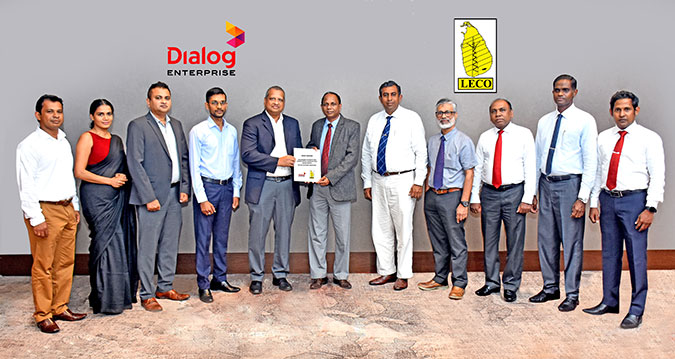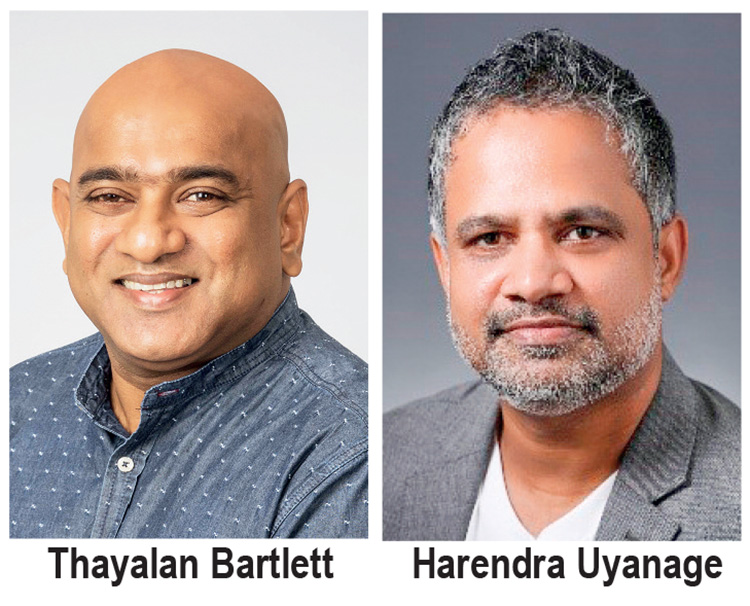Business
LECO deploys mission critical push-to-talk solution from Dialog Enterprise

Dialog Enterprise, the corporate ICT solutions arm of Dialog Axiata PLC, recently deployed a customized mission-critical push-to-talk (MCPTT) solution for Lanka Electricity Company (Private) Limited.The rapid-response arm of the Ceylon Electricity Board, LECO was established in 1983 to provide electrical service to underserved areas. This MCPTT project, awarded to Dialog Enterprise after a competitive bidding process had the objective of providing a state-of-the-art radio telecommunications system based on mission-critical push-to-talk over 4G-LTE technology to cover the LECO service grids in Galle, Moratuwa, Kalutara, Negombo, Kelaniya, Kotte and Nugegoda. The solution had to be able to fulfill LECO’s current and future requirements, with radio telecommunications features and services in voice, data and video, and with future-ready devices that worked right out of the box.
The hardware package that Dialog Enterprise provided consisted of a central dispatch unit with voice and video dispatching, geolocation, and recording, plus 65 vehicle-mounted and 60 hand held devices with voice, video streaming and messaging capabilities. These rugged handheld devices come with 5-inch screens, front and back cameras, GPS positioning and supersensitive DMR antennas, and are so reliable that they are even used in tunneling and mining operations.
Mission-critical user communications have a higher priority than public user communications as per 3GPP telecommunication standards. Therefore, mission-critical users can communicate with each other and with the control center uninterruptedly even when network traffic is orders of magnitude greater than usual due to unforeseen circumstances–for instance, during a national emergency or natural disaster, when unprecedently high call volume can overwhelm even the highest-capacity network.
The MCPTT devices provided by Dialog Enterprise feature a device-to-device communication mode that functions in the absence of cellular network coverage. This failsafe feature enables LECO users to communicate with each other within a specified radius albeit if a disaster like a tsunami takes down the cellular tower infrastructure and renders the network completely unavailable.
“This MCPTT solution operates at a higher priority than Internet services, and also having a device-to-device communication mode are huge pluses for LECO,” said Athula P. De Silva – Chairman, LECO. “Because when connectivity is interrupted due to unforeseeable circumstances–like a sudden violent storm, for instance–we are the professionals whose job it is to bring the network back up. With this, our dispatchers and field engineers are in constant touch since we are in complete control of our own internal communication channel. And since this solution uses GPS technology, dispatchers know exactly where the repairpersons are at all times. So, in the event of an outage, power can be restored much faster. If we had chosen the generic mobile voice service or push to talk over cellular (POC) instead, our rapid response team’s communications would have been vulnerable to the same disruptive factors and service interruptions as the general public–and that was totally unacceptable. We are the first line of defense against power outages. Dialog Enterprise’s MCPTT solution is a perfect fit for our requirements.”
“Apart from price and quality of service, one of the primary reasons why LECO chose Dialog Enterprise as their MCPTT solution provider is because this cutting-edge technology only works in 4G LTE and the best 4G coverage is with us,” said Navin Pieris, Group Chief Officer-Dialog Enterprise, Dialog Enterprise, Dialog Axiata PLC. “It is the fourth-generation wireless standard that offers increased network capacity and speed for cellphones and other cellular devices when compared to second-generation (2G) and third-generation (3G) technology.” Dialog has by far the most wide-ranging 4G LTE coverage among Sri Lankan mobile operators, with network coverage encompassing 94% of the country’s population and 78% of its geographical area—statistics confirmed by independent analytical reports such as Open signal. As a result, we’ve been approached by other service industry giants looking for solutions specifically designed for their specific requirements and we guarantee that this is the ideal solution for civil engineers, field technicians, and military service personnel.”
Dialog Enterprise’s MCPTT solution is massively scalable, with on-demand expandability depending on customer needs. It is connected through a separate Enhanced Packet Core (EPC) network and is not connected to the internet. Therefore, the Dialog Enterprise solution provides tighter security against external cyber threats. Dialog’s network availability is quantifiably the best among Sri Lankan mobile operators. Dialog has an island-wide maintenance depot network that enables it to respond to network failures faster than any other service provider in the country. Additionally, it maintains a dedicated enterprise support team trained for rapid response to enterprise customer issues and requests.
Business
HNB Assurance Recognized with Merit Award at the Great HR Awards 2025

HNB Assurance PLC was recognized at the Great HR Awards 2025, receiving the Merit Award in the Finance, Insurance, Real Estate, and Investment sector. This recognition reflects the company’s continued commitment to strengthening its people strategy, nurturing a progressive culture, leveraging technology and maintaining strong industrial relations.
Sharing his thoughts on this accomplishment, Lasitha Wimalarathne, Executive Director / Chief Executive Officer of HNB Assurance PLC, stated, “This recognition reiterates our belief that people are the true drivers of our success. Over the years, we have invested significantly in building an environment where our teams feel inspired and supported to deliver their best. As we continue to grow as one of Sri Lanka’s best insurance companies, this award reflects our ongoing efforts to build a workplace where both our people and our business can thrive. My sincere thanks go out to our HR team for continuously driving these initiatives.”
Commenting on the award, Navin Rupasinghe, Head of HR / DGM at HNB Assurance PLC, said, “Our people-first philosophy shapes every HR initiative we design, from strengthening learning pathways and leadership development to enhancing employee well-being and engagement. This recognition validates our ongoing efforts to build a workplace culture grounded in trust, inclusivity and performance. As we look ahead, we remain committed to evolving our HR practices to meet the expectations of our people and the future of work. My sincere thanks to the CIPM for this recignition.”
Business
MullenLowe Sri Lanka named Creative Agency of the Year in South Asia

MullenLowe Sri Lanka has been awarded Gold as the Rest of South Asia’s Creative Agency of the Year at the Campaign Agency of the Year Awards 2025, held recently at Mumbai’s ITC Maratha Hotel. The accolade marks a landmark year for the agency, driven by breakthrough ideas, ambitious brands, and a surge in economic activity.

Campaign Agency of the Year – South Asia 2025 (Rest of South Asia – Creative Agency) awarded to MullenLowe Sri Lanka
Guided by a clear creative vision and extensive category expertise across 111 brands in 33 sectors, MullenLowe strengthened its position through strategic leadership appointments, talent acquisition, and the integration of AI-enabled tools. These initiatives created an environment where creativity, learning, and commercial impact worked in tandem, supporting long-standing client relationships and consistent new business momentum.
Thayalan Bartlett, Executive Chairman, said, “Our growth is rooted in a people-first, creative-centred culture. By attracting top talent and focusing on continuous upskilling, we have enriched both our creative and strategic capabilities.”
The agency’s innovation was further enhanced by Fever, its AI-enabled production studio, and LoweGo, a subscription-based design unit, enabling faster and more scalable solutions for modern marketers. Training programs, including an international AI workshop in Baku for top creative minds, helped unify teams around technology-driven creativity, leading to MullenLowe’s highest Effie points haul in a decade.
Harendra Uyanage, Senior Vice President and Executive Creative Director, added, “This recognition celebrates a team that constantly stretches its creative boundaries, transforming every brief into opportunity.”
The win adds to a series of recent accolades, including Most Effective Agency of the Year at the 2024 Effie Awards, and multiple awards at Dragons of Sri Lanka and SLIM Digis 2025, cementing MullenLowe’s vision to become Sri Lanka’s most commercially impactful creative company by 2030.
Business
ComBank named Sri Lanka’s Best Trade Finance Bank at Euromoney Awards 2025

The Commercial Bank of Ceylon PLC was named Sri Lanka’s Best Trade Finance Bank at the prestigious Euromoney Transaction Banking Awards 2025, in recognition of the Bank’s strong performance and continued contribution to supporting Sri Lanka’s export and import sectors.
This global recognition from Euromoney, a leading authority in financial markets, celebrates institutions that demonstrate innovation, leadership, and measurable impact in transaction banking across cash management, payments, trade finance, and technology. Commercial Bank is Sri Lanka’s clear market leader in trade finance, commanding a 21% share in exports and a 14.26% share in imports, demonstrating its strong presence across both segments.
In 2024, the Bank supported over US$ 5 billion in trade transactions, underscoring its unmatched role in enabling the flow of goods, services, and foreign exchange. Its leadership has also been recognised regionally by the Asian Development Bank (ADB), which named Commercial Bank its Leading Partner Bank in Sri Lanka for the fourth consecutive year under the Trade and Supply Chain Finance Programme.
At the forefront of Commercial Bank’s recent innovations is ComBank TradeLink, Sri Lanka’s first fully integrated, end-to-end digital trade finance platform. The system brings all trade finance operations – from Letters of Credit to export collections and shipping guarantees – into one secure online interface, providing customers real-time visibility, faster processing, and paperless convenience. This digitalisation drive has redefined the client experience, reduced manual processes and improved turnaround times across thousands of transactions.
The Bank’s commitment to advancing Sri Lanka’s trade sector extends beyond technology. Through initiatives such as the ComBank Trade Club, which facilitates connections between buyers and suppliers both locally and internationally, and ComBank LEAP | GlobalLinker, a digital business networking platform for SMEs, the Bank is actively building bridges between Sri Lankan entrepreneurs and global markets. Its Diribala Exporter Development Programme further empowers micro, small, and medium enterprises to become export-ready, providing access to expert guidance, training, and financial support.
Reflecting on the award, Commercial Bank said the recognition from Euromoney was a tribute to the trust placed in the Bank by Sri Lanka’s exporters and importers, and to the dedication of its trade finance teams who continue to innovate and deliver excellence in a rapidly evolving global landscape.
As Sri Lanka’s largest private sector bank and the first to surpass US$ 1 billion in market capitalisation, Commercial Bank continues to lead in supporting national trade, driving digital transformation, and shaping a more inclusive and resilient export economy, the Bank said.
Commercial Bank was the first bank in the country to be listed among the Top 1000 Banks of the World, and has the highest Tier I capital base among all Sri Lankan banks. The Bank is the largest private sector lender in Sri Lanka and the largest lender to the country’s SME sector. Commercial Bank is also a leader in digital innovation and is Sri Lanka’s first 100% carbon-neutral bank.
Commercial Bank operates a network of strategically located branches and automated machines island-wide, and has the widest international footprint among Sri Lankan banks, with 20 branches in Bangladesh, a fully-fledged Tier I Bank with a majority stake in the Maldives, a microfinance company in Myanmar, and a representative office in the Dubai International Financial Centre (DIFC). The Bank’s fully owned subsidiaries, CBC Finance Ltd. and Commercial Insurance Brokers (Pvt) Limited, also deliver a range of financial services via their own branch networks.
-

 Features4 days ago
Features4 days agoFinally, Mahinda Yapa sets the record straight
-

 News6 days ago
News6 days agoOver 35,000 drug offenders nabbed in 36 days
-

 News5 days ago
News5 days agoCyclone Ditwah leaves Sri Lanka’s biodiversity in ruins: Top scientist warns of unseen ecological disaster
-

 News6 days ago
News6 days agoRising water level in Malwathu Oya triggers alert in Thanthirimale
-

 Features4 days ago
Features4 days agoHandunnetti and Colonial Shackles of English in Sri Lanka
-

 Business3 days ago
Business3 days agoCabinet approves establishment of two 50 MW wind power stations in Mullikulum, Mannar region
-

 Business6 days ago
Business6 days agoSri Lanka betting its tourism future on cold, hard numbers
-

 News6 days ago
News6 days agoNew landslide alerts as Ditwah aftermath worsens













